It looks like you're using an Ad Blocker.
Please white-list or disable AboveTopSecret.com in your ad-blocking tool.
Thank you.
Some features of ATS will be disabled while you continue to use an ad-blocker.
share:
It sure is interesting, but isn't this an older discovery?
A second entrance was believed to be discovered behind the kings tomb.
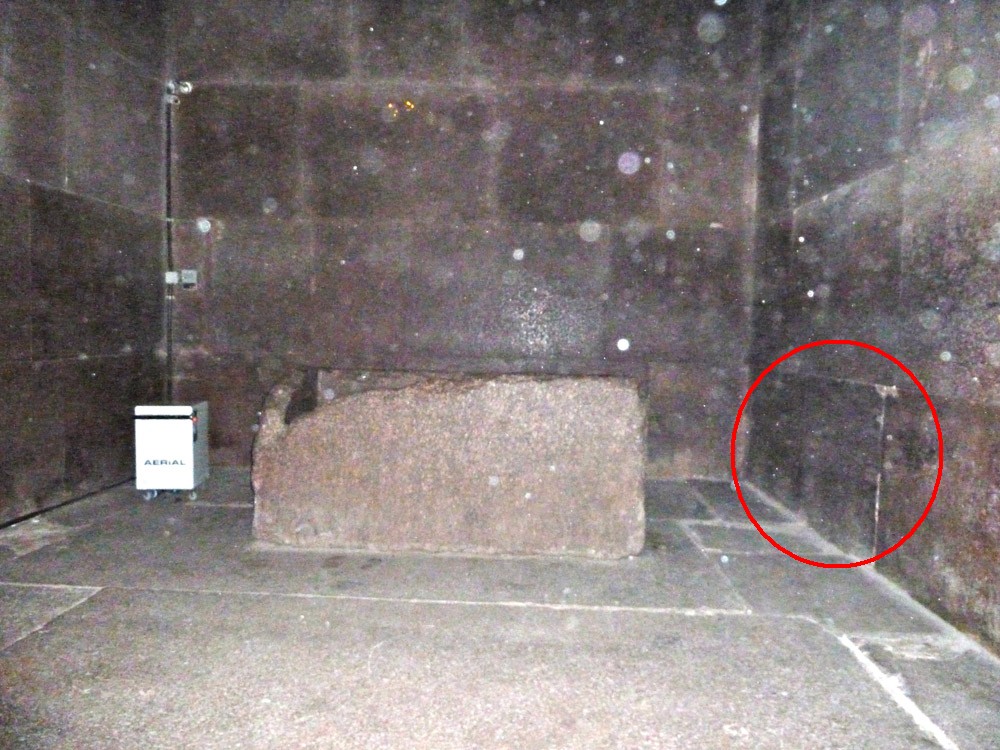
check the stones...
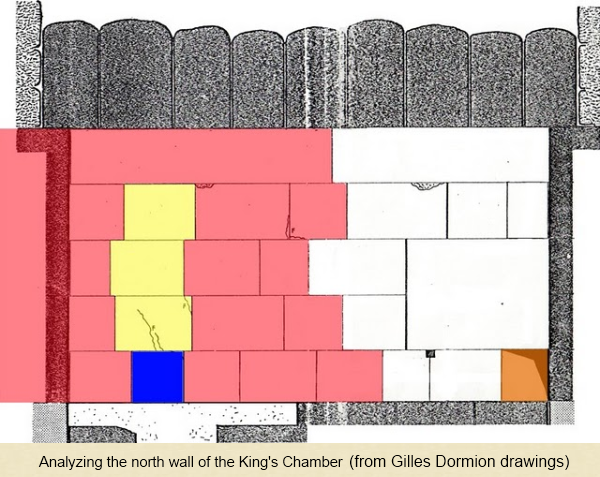
source
Here is a video explaining it
(jump to 19:00 )
How the mechanism supposedly worked:
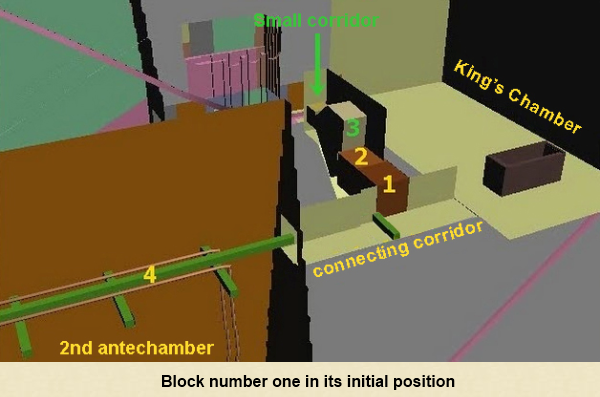
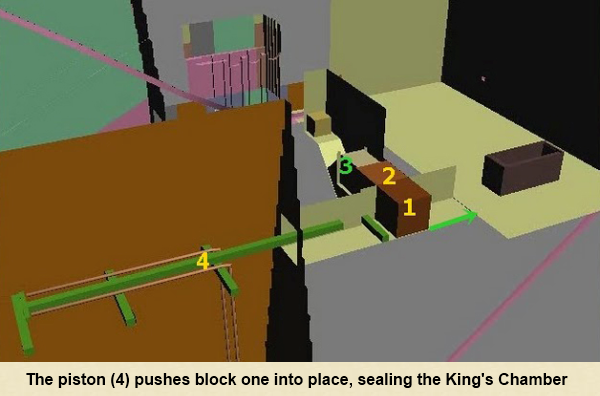
A second entrance was believed to be discovered behind the kings tomb.

check the stones...

So let’s look at the north wall, following Jean-Pierre Houdin’s instructions:
What do we see on the wall? On the right (east side, low down, in orange), the entrance through which we currently enter this room. On the left, the layout of granite blocks forms a doorway (in pink) that takes the entire weight of the (dark) granite ceiling beams. The (yellow) blocks filling the doorway do not bear on the central block at the bottom (blue). This seals the second entrance. It is free, exactly like the block that once sealed the first entrance. Free: in other words, it could be moved… for example, at the end of the king’s funeral ceremony, when the pyramid had to be sealed.
source
Here is a video explaining it
(jump to 19:00 )
How the mechanism supposedly worked:


the newly discovered void appears to be roughly the same shape as the State of Tennessee , so I'm assuming it's a giant fishing hole, but I'm not an
Egyptologist.
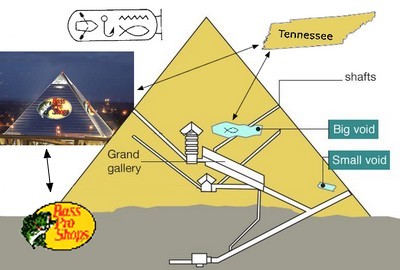

edit on 5-11-2017 by Prankster because: (no reason given)
Here is Herodot, who lived from abouit 484 to around 424 BC, and visited Egypt.
Herodot about the pyramids
Now, Herodot was a greek, and at this time the upper echelons of Egyptian society was descendant from greeks that now ruled Egypt afte the conquest of Alexander. This is a report, obviously, of the pyramids over a thousand years after their construction, but still it is more contemporary than many other texts.
What is both great, and bad, about Herodot is that he reported everything he was told. No matter how stupid he thought it sounded, so he has no "filter" at all. If he is told something, he tries to report on it, and only occasionally will he comment that he finds that this sounds unlikely.
Anyway, what is interesting is that he speaks quite clearly about the excavations below the Great Pyramid, and also about the fact that a portion of the Nile was diverted "into it". In contrast to the second largest pyrmaid, that of Khefren.
Have they ever discovered any large scale excavations beneath the pyramid?
Cheers,
BT
Herodot about the pyramids
Now, Herodot was a greek, and at this time the upper echelons of Egyptian society was descendant from greeks that now ruled Egypt afte the conquest of Alexander. This is a report, obviously, of the pyramids over a thousand years after their construction, but still it is more contemporary than many other texts.
What is both great, and bad, about Herodot is that he reported everything he was told. No matter how stupid he thought it sounded, so he has no "filter" at all. If he is told something, he tries to report on it, and only occasionally will he comment that he finds that this sounds unlikely.
Anyway, what is interesting is that he speaks quite clearly about the excavations below the Great Pyramid, and also about the fact that a portion of the Nile was diverted "into it". In contrast to the second largest pyrmaid, that of Khefren.
Have they ever discovered any large scale excavations beneath the pyramid?
Cheers,
BT
edit on 5-11-2017 by beetee because: Clarification - I ment "large scale" excavations - because from Herodot it sounds they are rather
extensive
originally posted by: beetee
Here is Herodot, who lived from abouit 484 to around 424 BC, and visited Egypt.
Herodot about the pyramids
Now, Herodot was a greek, and at this time the upper echelons of Egyptian society was descendant from greeks that now ruled Egypt afte the conquest of Alexander. This is a report, obviously, of the pyramids over a thousand years after their construction, but still it is more contemporary than many other texts.
What is both great, and bad, about Herodot is that he reported everything he was told. No matter how stupid he thought it sounded, so he has no "filter" at all. If he is told something, he tries to report on it, and only occasionally will he comment that he finds that this sounds unlikely.
Anyway, what is interesting is that he speaks quite clearly about the excavations below the Great Pyramid, and also about the fact that a portion of the Nile was diverted "into it". In contrast to the second largest pyrmaid, that of Khefren.
Have they ever discovered any large scale excavations beneath the pyramid?
Cheers,
BT
There was a recent announcement that they had discovered a papyrus paper describing how the Egyptians constructed a canal under the pyramid so that blocks could be unloaded by boat.
originally posted by: blackadder01
a reply to: Scott Creighton
I've always imagined some sort of portal in there, the world is a lot older than us weak human beings would like to think. I can't tell you what's there but if it's something really significant we will never hear about it.
Anything is possible man. Undoubtedly some strange stuff was going on in those pyramids...
a reply to: Scott Creighton
Seems like some kinda pressure chamber to me or a containment zone before venting gas/steam/by-products...
I don't buy the "it's a tomb" nonsense.
I wonder how many other shafts have yet to be discovered, doesn't look like the detectors were terribly accurate?
Seems like some kinda pressure chamber to me or a containment zone before venting gas/steam/by-products...
I don't buy the "it's a tomb" nonsense.
I wonder how many other shafts have yet to be discovered, doesn't look like the detectors were terribly accurate?
a reply to: EA006
Absolutely. I don't buy into the theory of the pyramids being burial grounds. Something fishy was going on in there, more than just ritualistic. I don't pretend to know what they were doing in/with the pyramids because I don't know, but it was a lot more than just burying someone in there...
Absolutely. I don't buy into the theory of the pyramids being burial grounds. Something fishy was going on in there, more than just ritualistic. I don't pretend to know what they were doing in/with the pyramids because I don't know, but it was a lot more than just burying someone in there...
a reply to: beetee
Did he see the excavations or was he told about them?
How far did they divert the nile?
Difficult to say geologically how far the Nile has moved from the time the pyramids were built.
I read somewhere there was water damage on the sphinx that was several thousand years old... not one thousand
I know you're going by the info you have lol
You might not be able to answer.
Did he see the excavations or was he told about them?
How far did they divert the nile?
Difficult to say geologically how far the Nile has moved from the time the pyramids were built.
I read somewhere there was water damage on the sphinx that was several thousand years old... not one thousand
I know you're going by the info you have lol
You might not be able to answer.
edit on 5-11-2017 by EA006 because: (no reason given)
a reply to: Scott Creighton
Both voids are probably leftovers from the hiding of the true internals of the pyramid.
They had alternate paths to alternate chambers which are now hidden by dropping large stone blocks down into place.
My guess is also that the 'real' chambers were filled with sand and an attempt to breach them will spill the sand out and cause a further reconfiguration of the pyramid internals and will also trap those who would try and steal from the pyramid.
Both voids are probably leftovers from the hiding of the true internals of the pyramid.
They had alternate paths to alternate chambers which are now hidden by dropping large stone blocks down into place.
My guess is also that the 'real' chambers were filled with sand and an attempt to breach them will spill the sand out and cause a further reconfiguration of the pyramid internals and will also trap those who would try and steal from the pyramid.
a reply to: Scott Creighton
That's an interesting theory and coincides with Plato's idea that the pyramids were made to warn people of the recurring deluge.
I think if anything the local authorities lack political will to drill because they know mystery sells! Millions of New Age cultists travel there every year to do weird things inside. That's countin money!
That's an interesting theory and coincides with Plato's idea that the pyramids were made to warn people of the recurring deluge.
I think if anything the local authorities lack political will to drill because they know mystery sells! Millions of New Age cultists travel there every year to do weird things inside. That's countin money!
a reply to: stormcell
That's interesting.
The problem with Herodot, or Herodotus, is that he is simply reporting things that he was being told by his "guides" that were probably egyptian priests. This was, as you know, long after the actual fact, so the information is skewed by a thousand years or so of mythmaking and storytelling.
What makes it interesting, to me at least, is that the egyptians themeselves seemed to emphasize what was under the pyramid as most important, and not the pyramid themselves.
Now, this could of course be an attempt to deflect or misguide, but as the tombs themselves were probably all robbed long ago when Herodot visited, it is somewhat hard to see the point.
When reading Herodots account it almost seems like most of the pyramids "secrets", whatever they might be, were placed not into the pyramid but under it, and then the Nile diverted to "protect" them.
There has been all sorts of reports about what is under there, by Von Däniken and others, so it is difficult to know what is legitimate and what is not.
That's interesting.
The problem with Herodot, or Herodotus, is that he is simply reporting things that he was being told by his "guides" that were probably egyptian priests. This was, as you know, long after the actual fact, so the information is skewed by a thousand years or so of mythmaking and storytelling.
What makes it interesting, to me at least, is that the egyptians themeselves seemed to emphasize what was under the pyramid as most important, and not the pyramid themselves.
Now, this could of course be an attempt to deflect or misguide, but as the tombs themselves were probably all robbed long ago when Herodot visited, it is somewhat hard to see the point.
When reading Herodots account it almost seems like most of the pyramids "secrets", whatever they might be, were placed not into the pyramid but under it, and then the Nile diverted to "protect" them.
There has been all sorts of reports about what is under there, by Von Däniken and others, so it is difficult to know what is legitimate and what is not.
a reply to: EA006
You should have a look at Herodots Histories yourself. It is quite an entertaining read, and if not a primary source, then at least a more contemporary source than many others.
You have to read what he is relating in the context of who is (probably) doing the telling, and what he might or might not have been getting wrong, but the fact remains that he was there at a point in time where the pyramid itsef was much different than it is today.
Here is a link to a collection of some historical sources for the Pyramids:
Link
I have not vetted them, so some due dilligence is appropriate if anyone wants to delve deeper into this.
Cheers,
BT
You should have a look at Herodots Histories yourself. It is quite an entertaining read, and if not a primary source, then at least a more contemporary source than many others.
You have to read what he is relating in the context of who is (probably) doing the telling, and what he might or might not have been getting wrong, but the fact remains that he was there at a point in time where the pyramid itsef was much different than it is today.
Here is a link to a collection of some historical sources for the Pyramids:
Link
I have not vetted them, so some due dilligence is appropriate if anyone wants to delve deeper into this.
Cheers,
BT
originally posted by: chr0naut
a reply to: Scott Creighton
Both voids are probably leftovers from the hiding of the true internals of the pyramid.
They had alternate paths to alternate chambers which are now hidden by dropping large stone blocks down into place.
My guess is also that the 'real' chambers were filled with sand and an attempt to breach them will spill the sand out and cause a further reconfiguration of the pyramid internals and will also trap those who would try and steal from the pyramid.
This sounds pretty sensical/likely. Also potentially may be an architectural feature to save weight.
I don't think we even need to get into wild theories about the Pyramids. The void can be explained using the official narrative.
It could contain the mummy we never found in the Kings Chamber, plus all the objects and "loot" that would have been stashed in there with him. Seal it off, with no way back in or to even know there is a room there, then divert everyone's attention to the Grand Gallery and Kings Chamber.
Until the advent of modern Muon scanning technology, the plan was foolproof!
(Before I get jumped on, it's just a theory )
It could contain the mummy we never found in the Kings Chamber, plus all the objects and "loot" that would have been stashed in there with him. Seal it off, with no way back in or to even know there is a room there, then divert everyone's attention to the Grand Gallery and Kings Chamber.
Until the advent of modern Muon scanning technology, the plan was foolproof!
(Before I get jumped on, it's just a theory )
a reply to: beetee
Very interesting read.
Seems Herodotus didn't venture inside the pyramids himself and the other accounts are very vague about what was where.
Even the accounts of the water channel cut to transport building material are inaccurate which leads me to suspect it didn't happen.
Also the sphinx's disappearance and reappearance multiple times through burial makes me think the original water damage is a lot older than the accounts lead you to believe.
Very interesting read.
Seems Herodotus didn't venture inside the pyramids himself and the other accounts are very vague about what was where.
Even the accounts of the water channel cut to transport building material are inaccurate which leads me to suspect it didn't happen.
Also the sphinx's disappearance and reappearance multiple times through burial makes me think the original water damage is a lot older than the accounts lead you to believe.
new topics
-
Thousands Of Young Ukrainian Men Trying To Flee The Country To Avoid Conscription And The War
Other Current Events: 1 hours ago -
12 jurors selected in Trump criminal trial
US Political Madness: 3 hours ago -
Iran launches Retalliation Strike 4.18.24
World War Three: 4 hours ago -
Israeli Missile Strikes in Iran, Explosions in Syria + Iraq
World War Three: 4 hours ago -
George Knapp AMA on DI
Area 51 and other Facilities: 10 hours ago -
Not Aliens but a Nazi Occult Inspired and then Science Rendered Design.
Aliens and UFOs: 10 hours ago
top topics
-
BREAKING: O’Keefe Media Uncovers who is really running the White House
US Political Madness: 17 hours ago, 26 flags -
George Knapp AMA on DI
Area 51 and other Facilities: 10 hours ago, 25 flags -
Israeli Missile Strikes in Iran, Explosions in Syria + Iraq
World War Three: 4 hours ago, 13 flags -
Louisiana Lawmakers Seek to Limit Public Access to Government Records
Political Issues: 12 hours ago, 7 flags -
So I saw about 30 UFOs in formation last night.
Aliens and UFOs: 15 hours ago, 6 flags -
Iran launches Retalliation Strike 4.18.24
World War Three: 4 hours ago, 5 flags -
Not Aliens but a Nazi Occult Inspired and then Science Rendered Design.
Aliens and UFOs: 10 hours ago, 5 flags -
Do we live in a simulation similar to The Matrix 1999?
ATS Skunk Works: 16 hours ago, 4 flags -
The Tories may be wiped out after the Election - Serves them Right
Regional Politics: 13 hours ago, 3 flags -
12 jurors selected in Trump criminal trial
US Political Madness: 3 hours ago, 3 flags
active topics
-
President BIDEN Warned IRAN Not to Attack ISRAEL - Iran Responded with a Military Attack on Israel.
World War Three • 43 • : WeMustCare -
Israeli Missile Strikes in Iran, Explosions in Syria + Iraq
World War Three • 52 • : WeMustCare -
Mandela Effect - It Happened to Me!
The Gray Area • 107 • : inflaymes69 -
Terrifying Encounters With The Black Eyed Kids
Paranormal Studies • 45 • : daskakik -
Not Aliens but a Nazi Occult Inspired and then Science Rendered Design.
Aliens and UFOs • 12 • : BeyondKnowledge3 -
Elites disapearing
Political Conspiracies • 31 • : Degradation33 -
MULTIPLE SKYMASTER MESSAGES GOING OUT
World War Three • 47 • : SchrodingersRat -
12 jurors selected in Trump criminal trial
US Political Madness • 21 • : VictorVonDoom -
British TV Presenter Refuses To Use Guest's Preferred Pronouns
Education and Media • 64 • : Degradation33 -
Iran launches Retalliation Strike 4.18.24
World War Three • 14 • : Cloudbuster1
